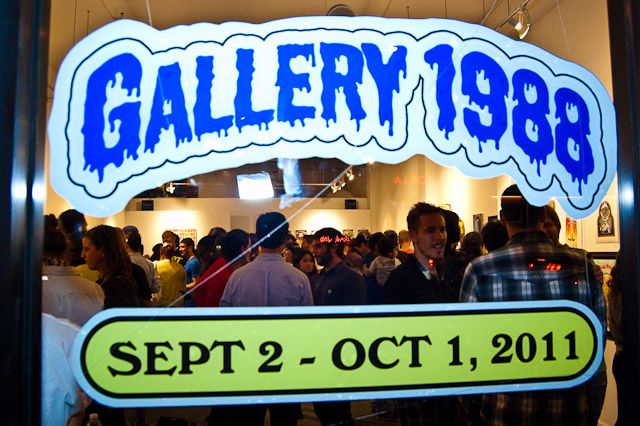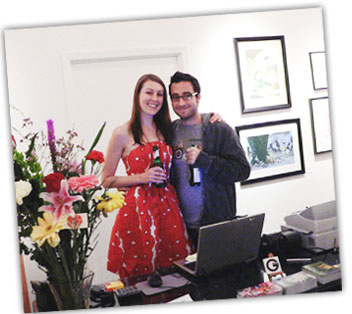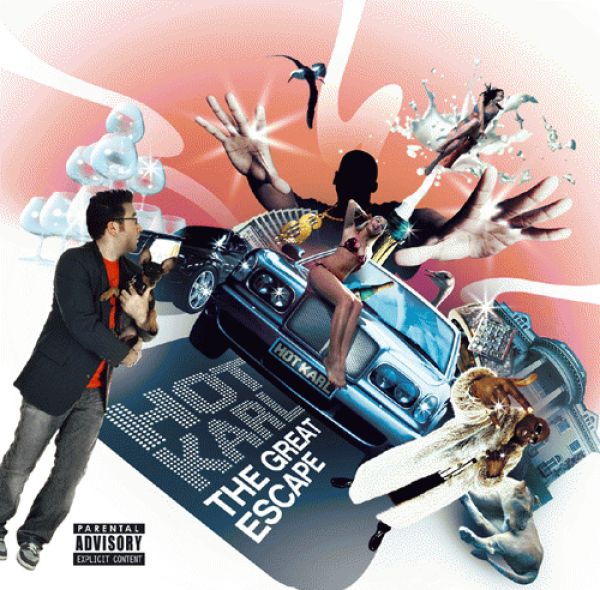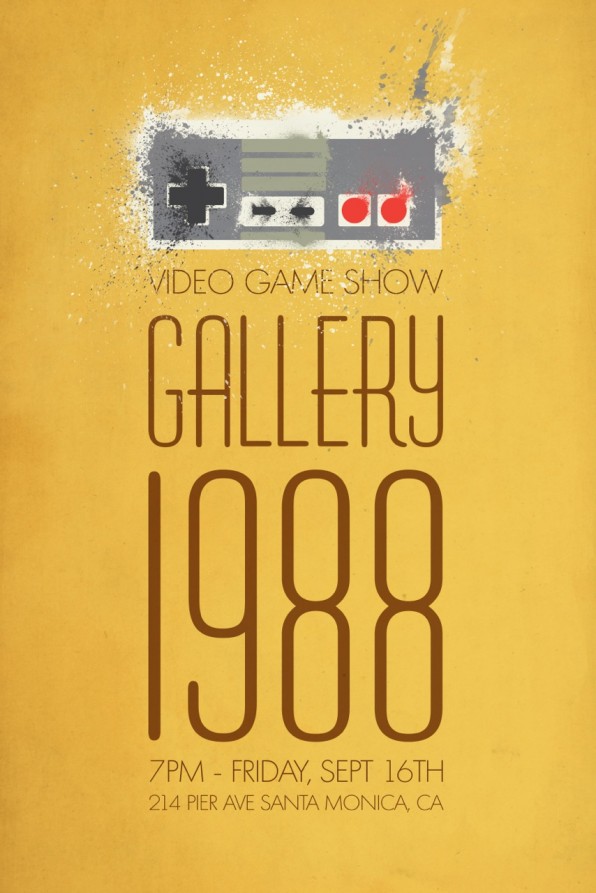Jensen Karp (pictured above with friend Ernie Hudson) and Katie Cromwell are the founders of Gallery 1988, which is on an incredible run of success with shows inspired by cult movies and pop culture relics featuring some of the most interesting artists working in all mediums, styles, and subcultures. This Friday at 7pm, the Venice Gallery 1988 (214 Pier Avenue) will open the Old School Video Game Show. Jensen found time for LA TACO discuss art, the art business, tacos, "lowbrow" art, and pop culture.
LA TACO: What's your favorite taco spot?
JENSEN KARP: I've lived in Los Angeles my whole, and to be honest, I've always been a loyalist to El Comprade and Lucy's El Adobe just based on history. I know they aren't secret spots, like some of my hipster friends cherish, but my two picks are storied LA tradition and I just grew up eating there. Katie and I are also both USC grads, so we have a soft spot in our heart for El Cholo, but that's just because they'd let us drink there when we were 19.
T: One thing I love about your Gallery is that not only do you do shows with themes, but the themes are actually interesting, which seems to be fairly unique in the gallery world for some reason. Who comes up with the show concepts and how does that process work?
J: That one is in my job description. When we opened the gallery in 2004, we literally did it to make fun of the stuffy art scene in Los Angeles, or the hot rod lowbrow underground scene that people thought was a "youth movement." Those genres couldn't have been more off base for the generation that Katie and I are in, and we say all our friends starting careers and starting to get some income to spend. We basically sat down and asked each other, what would we hang on our walls if we had the choice, and we quickly realized that pop culture was the common thread for everyone in our age group, including the artists. So we started with video game themes and cult movies, two things that have basically been my main interests since I was 6 years old. And they were huge successes, so from there it was about just staying focused and making sure we align ourselves with things we LOVE, because at the end of the day if we as owners don't want the art, no one else will. I usually throw out ideas to Katie, and she'll agree or disagree (the only real "no" I got was a Saved By The Bell show, and she did go with a show based on Wet Hot American Summer - so you win some, you lose some). But picking themes is my favorite part of the job, because as an avid pop culture junkie myself, I get excited imagining artists creating pieces in these themes, and to see that come true is really rewarding. I just ask myself, what do I want to see in the gallery and that's the whole process.

T: My art history knowledge only goes so far. When I was preparing this interview, lots of people refer to G1988 as a home for "lowbrow" art, which was a term I'd heard but don't quite understand. I'm not really sure that what you're doing fits into that scene. Do you see your gallery as being part of a specific movement or subculture?
J: I think being called "lowbrow" is the worst possible scenario for our gallery. When I hear "lowbrow" I imagine the motorcycle, hot rod, outsider art scene that was really prevalent here in LA in the 80's and 90's. It's a generation removed from any influence I've ever had, especially having no background in art history before opening the gallery (my partner is a USC Art History grad though). We like to think we're just considered "pop culture art" or "pop art." Even with artists like Dan McCarthy or Kurt Halsey, artists who don't directly show their pop culture influences as obvious as the Garbage Pail Kids show, their influence lies in pop culture. Where artists used to endlessly talk about Monet and Picasso, these guys would rather talk about David Lynch or Nintendo. They obviously respect the masters, but this is a different time and our gallery deals with artists and buyers who have these shared interests, not so much the same as the "lowbrow" term and movement that came before us.
T: So was it difficult to get the Gallery off the ground? Was there a moment when you know it was going to make it?
J: It was brutal. The first two years were filled with just having shows and trying to convince people we were going to stay in business. A lot of us sitting around with amazing art on the walls, but with Katie and I just playing online poker. That first year we showed artists like Luke Chueh, Bob Dob, Revok and Joe Ledbetter. It wasn't really much different than what we do today, we just needed to put in the legwork, mostly because people, including myself now, don't like buying art from a place that could go out of business at any time. You want to know it's established and you have to trust their judgement on both displaying art that will speak to you and not just following fads for quick money. But yes, there were MANY times where Katie and I had to start thinking to ourselves, why did we think this was going to work in the first place. We had a very "build it and they will come" feeling, and luckily it worked out where people started to learn we were going to be around for a bit.

Jensen and Katie
T: That makes me wonder, what were you doing professionally prior to opening the gallery?
J: I was actually in a rap group signed to Interscope called Hot Karl. I had songs with Kanye West, Will.i.Am, Redman, Fabolous, Mya, etc. It was a crazy opportunity that came to me while I was attending USC, but it also was never really something I aspired to do. It was just something I couldn't say no to. So as I say a real way out of it, I decided to take the money I made from rapping and put it into something I could be proud of as a career, and depend on, so the gallery was born with my partner Katie. I was always more interested in the marketing and visual approach to selling music, so it seemed that more curator-based stuff was where I was hoping to go the whole time.

HOT KARL
T: That's awesome! You were actually a part of pop culture before becoming its curator. Obviously Pop Culture is at the heart of Gallery 1988, mostly stuff from the recent past. What in the current pop culture do you think will make for an amazing show 10 years from now?
J: Well, I LOVE Paul Thomas Anderson a lot. And in ten years, it would be very cool to do a tribute to him, but that's pretty self serving and slightly heavy handed. I'm probably alone in wanting a Hard Eight piece in my living room. But as far as what's happening now, I like to think something like Mad Men could make an amazing show. I'm also totally holding back my real answers because with how many galleries now do pop culture shows, I'm keeping the gems to myself.
T: What's your favorite corner of Los Angeles?
J: I grew up loitering Melrose. It meant so much to me growing up. I would have my parents drive me down to go to Worksmens Outlet and Fat Beats. I remember buying the first Wu-Tang 12" inch on this street. This has always been my favorite street in LA and it's a good marketplace. Obviously, it's lost some of of its trendsetting ways and become a bit more disposable, but I have a lot of pride for Melrose (and obviously Melrose/La Brea where the gallery is) and I connect with it still. Cool stuff will continue to happen on Melrose. I love a lot of our street neighbors like Golden Apple Comics, Brooklyn Projects, Munky King and M Cafe. For most of us though, you just have to go a little more east, which is a nice way to disconnect ourselves from some of the crappy shops on Melrose.
T: Who are some of the young artists that you're really excited about?
J: Funny enough, the newest artist I'm into is actually the eldest artist we show. His name is Robert Brandenburg and he lives in Ohio. He basically takes these old paintings and photos he finds at swap meets or garage sales and paints small elements of pop culture into the existing pieces. The pieces are awesome. He'll take a landscape and add dragons softly into the distance, or a painting of a lion and add Winnie The Pooh running away in fear. We have a solo show with him to kick of 2012 and I'm really excited to see what he comes up with.
T: I have read that you focus on clients outside the art establishment, which is great, but clearly one reason most galleries
focus on existing art buyers is because those people easier to reach. Where do your art buyers come from and how do they generally find you?
J: I'm a big fan of this book called Blue Ocean Strategy by W Chan Kim and Renee Mauborgne, which basically says that in order to really make a dent in business, you need to find your own "blue ocean" and keep away from the "Red Ocean Strategy," which is just a marketplace with tons of people in it, fighting over the same money and spilling blood everywhere. After a few years of G1988, a bunch of galleries started to open that focused on younger and affordable artists, who were in the past constrained to one-night art events because the scene couldn't sustain high overheads, like rent. We saw all of these galleries literally fighting over the same artists and same buyers, and in most cases the galleries were opened by people who had been buyers at G1988 themselves. It became too much for us and we saw the writing on the wall with the recession approaching. So we really had to zone in on our specific buyer, who had pride in hanging G1988 art on their wall, the one who could help us find our own "blue ocean," and see what he/she wanted. And just talking to the buyers, asking some of the customers who were frequently buying prints or original art, really helped guide us into our own little world. And what the blogs were expecting from us, that was important to. I kinda laugh when the "art establishment" blogs talk about us in a way that makes us seem like the ugly stepchild - because we have pop culture art shows. That was exactly the plan to be honest. Let them create the crowded red marketplace, and let us swim by, introducing new artists they can all fight over down the road after they get exposure from our pop culture shows.

T: You mention "the blogs", and also using the internet to find new artists; what role does the internet play in your work? What are some of your favorite sites?
J: We have been using the Internet to find new artists since the day we decided we'd open an art gallery in 2003. My partner Katie actually stumbled on Luke Chueh's website in '03, just be clicking links over and over. It's been so important to us not only to find artists, but for buyers to find us. An overwhelming amount of our business now is over the Internet, especially since we're getting up to 100,000 hits a day at times. My absolute favorite blogs that I check daily for art related things are OMGPosters and Super Punch, and then I'll just mindlessly push buttons and end up other places. We take a lot of pride in our blog too, which is g1988.blogspot.com. We keep it old school.
T: Do you have any lucky numbers?
J: My whole life I've been really around the number 8. I was born November 8th at 8 PM, etc. And the first name we had at the gallery was going to be "Anthony Michael Hallway." Our lawyer screamed at us and told us why that would be a stupid idea. So we were stuck. I wanted to go with "1986" because it was the year the Mets won the world series as a rag tag group of misfits and I kinda saw Katie and I as them. But Katie convinced me to pick a more LA-centric year, and so I pitched her "1988" where the Dodgers and Lakers won, Wayne Gretzky came to the Kings, NWA released Straight Outta Compton, etc. And so now my lucky number is 88. But that's all sort of an afterthought.
Learn More about Gallery 1988, their upcoming shows, locations, etc. on their website: http://nineteeneightyeight.com/







